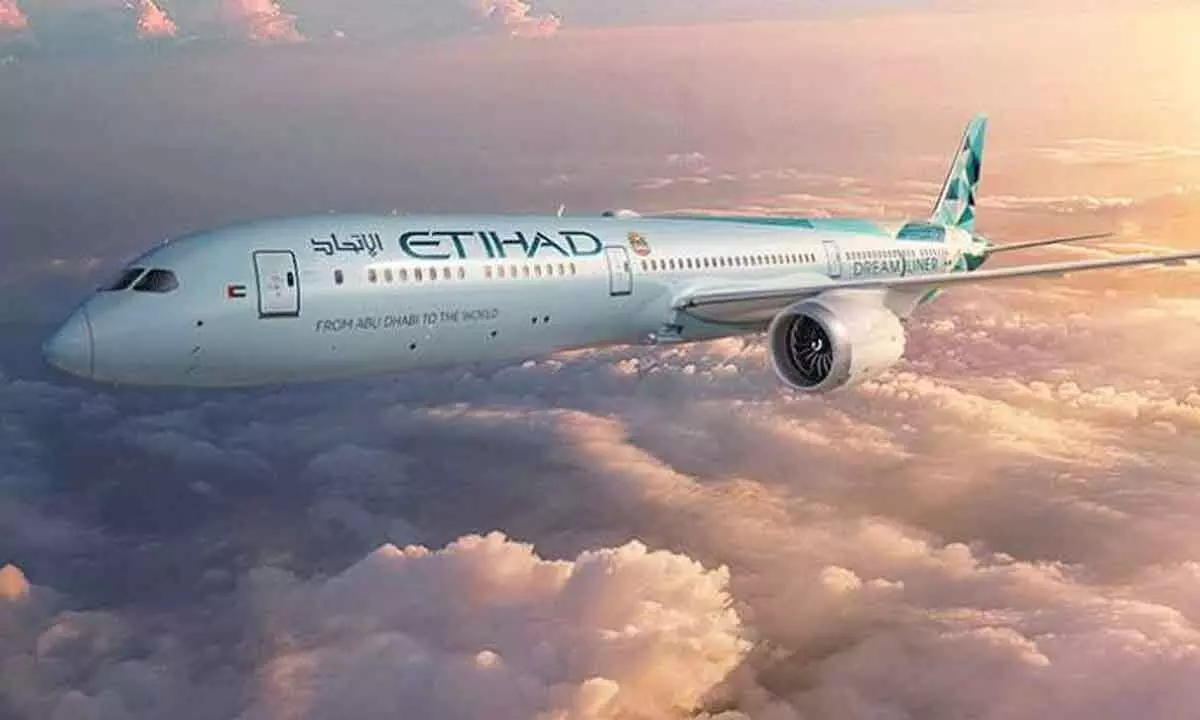Etihad Airways & World Energy join hands to decarbonise aviation
Signs MoU to establish a long-term strategic partnership to decarbonise flights through in-sector emissions reductions
image for illustrative purpose

Etihad Airways and World Energy, a carbon-net-zero solutions provider, announced the signing of a historical Memorandum of Understanding (MoU) to establish a long-term strategic partnership to decarbonise flights through in-sector emissions reductions. Etihad is the first commercial airline to participate in World Energy's recently launched service for airline and corporate climate leaders taking real action to achieve net-zero goals.
The announcement comes on the heels of the two companies powering the first net-zero flight using Sustainable Aviation Fuel (SAF) via a Book & Claim system. This is accomplished by displacing approximately 26,000 gallons of petroleum-based jet fuel through the use of net-zero equivalent gallons of World Energy's SAF at Los Angeles International Airport (LAX). The result was the elimination of approximately 250 metric tons of carbon related to Etihad's regular routing flight from Washington Dulles to Abu Dhabi during COP27.
The Book & Claim MoU between Etihad and World Energy establishes the pending agreement between the two companies, which is the first of its kind, long-term contract to supply an airline with the environmental attributes associated with SAF produced in Los Angeles, California.
World Energy, working with logistics partners, will deliver the physical SAF to LAX, which will displace conventional fossil fuel required by aircraft flying out of the airport. Etihad will receive the emission reductions in the form of SAF certificates (SAFc) once World Energy blends the SAF and it achieves 'drop-in' ASTM certification. Etihad in turn will be able to include their customers on the certificates, which will allow those customers to mitigate the emissions related to business flights. Both the physical SAF delivery and the SAFc ownership transfer will be independently verified by an auditor.
The Book & Claim system is an efficient method to achieve carbon emission reductions in aviation and make meaningful progress toward achieving climate goals. RSB (Roundtable on Sustainable Biomaterials), the organization that established this system, is working with Etihad and World Energy to include this flight as part of the RSB Book & Claim Manual testing as an official "pilot." All actions will comply with the RSB draft guidance, which includes third-party verification. All parties view Book & Claim as a necessary solution to unlock corporate-end-customers who are willing to commit the resources, and grow SAF demand, beyond what airlines alone can support financially. SAF is already recognized by Science Based Targets Initiative (SBTi) as a valid action to mitigate aviation emissions. RSB's Book & Claim System will help demonstrate to the voluntary greenhouse gas accounting bodies that the purchase of the SAF via Book & Claim can be done in a robust and credible way that significantly accelerates fossil displacement and sectoral decarbonisation.
IATA member airlines and the wider aviation industry are collectively committed to ambitious emissions reduction goals. Sustainable Aviation Fuel has been identified as one of the key elements in helping achieve these goals. Governmental support is essential to using sustainable aviation fuels to achieve the industry's climate goals. Over 450,000 flights have taken to the skies using SAF. Over 100 million litres of SAF were produced in 2021. SAF can reduce emissions by up to 80 per cent during its full lifecycle. Around $17 billion of SAF are in forward purchase agreements in 2022. More than 50 airlines now have experience with SAF.
SAF is currently expected to account for 65 per cent of carbon mitigation in 2050. It will be the largest contributor to the industry's sustainability. Government incentives for SAF could see 30 billion liters of production capacity globally by 2030. Japan and Singapore have demonstrated an exemplary approach to SAF, actively involving the industry in the consultation process, and in promoting domestic production of SAF.
The problem is the limited supply and high costs. In 2021, only 125 million liters of SAF were available on the market. That was less than 0.05 per cent of the total fuel used.
Neat SAF is a 100 per cent sustainable fuel made entirely of renewable resources and contains no fossil-based feedstock. It is not co-processed with fossil fuel in traditional oil refineries, and its carbon attributes comply with all state and US federal regulations for advanced biofuels. Its lifecycle carbon emissions are currently up to 85 per cent lower than conventional jet fuel. It is currently approved at a 50/50 blend level with conventional jet fuel for commercial use. World Energy continues to collaborate with industry leaders to gain approval for pure 100 per cent renewable SAF use in regular commercial aviation to enable a future of carbon net-zero fossil-free flight.

